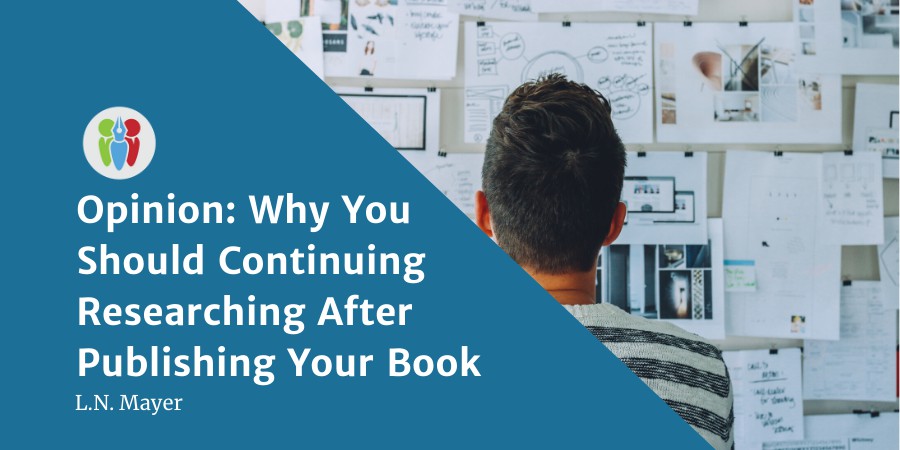Getting your first book to publication is an enormous feat of learning, time and energy and iteration. But what do you about those learning habits once you've finally published it? Well, ALLi author member L. N. Mayer suggests we should continue researching and learning throughout our careers.
The Advice You've Forgotten
If there’s one piece of advice you haven’t heard yet… it might be this.

Author L. N. Mayer
Finishing a book is an exciting step in your life—as well as the life of the book. You’ve gone through revision, editing, beta-reading and ARC distribution. You’ve most likely shown your soon-to-be-published book to your closest friends and family and received great constructive criticism and encouragement. You’ve most likely read many different blogs, found multiple services to help you publish independently and have read the hundreds of checklists on marketing and promoting your book.
And you’re probably doing everything right. Except, I’m willing to wager, you’re doing one thing very wrong.
Are you ready to hear what it is?
You’ve stopped doing research.
Continue Researching
But your book is polished and formatted, you say. Your galleys are available and you have your publication date locked down. After months (or years) of researching how to turn your idea into a book, the end to this very long process is finally in sight.
And this is where you are mistaken!
Conducting research about how to publish a book seems like something that should be done in the weeks following your decision to publish independently. I’d like to argue, however, that it’s a lifelong pursuit. If you are not setting aside at least 15 minutes each day to do some research, I strongly encourage you to set this goal for yourself now!
What Kind of Research?
By research, I mean:
- How and from who to get reviews
- How and who can help promote your book
- How and who provides innovative platforms leading to increase in exposure
- Even how to continue improving your craft as a writer.
The list goes on.
My Experience of Continued Research
Three months ago, I thought I had seen enough checklists on book writing, editing and publishing to get me through the end of 2020. I was wrong. Every day, I find a different organisation, promotion, association, and/or yet another checklist with information worth its weight in 5-star reviews. This fact blows me away most of all: the daily frequency of my discoveries. After all, so many blogs and checklists share the same advice… until you find some that don’t. And these are the ones that open up a whole other world of possibilities.
For example, one avenue of research for older generations of writers is to peruse YouTube. Meg LaTorre from iWriterly is a great source of straight-forward and sensible advice.
Where to Research
One piece of advice for millennials: get offline and do some research at your local library. For example, you might ask what books are circulating the most at the moment. You could also look at what books are prominently placed on shelves. Another tip is to browse ‘Librarian Picks’ and look at the front matter—or strike up a conversation with the librarians and ask them why they picked a book.
A game-changing piece of information I found the last time I took a trip to a public library was actually in a book I picked up, Imagination: The Science of Your Mind’s Greatest Power. In the book, the author Jim Davies writes: “… many people actually consume fiction with the explicit goal of managing their moods.” As logical as this sounds, this single sentence has changed the way I think about a set of readers I didn’t realize existed.
A few other tips that I’ve found over the past month:
- a Google ‘Knowledge Panel’ can give validity to your public presence
- there are sites that explain how to do and where to send press releases for books
- ensuring that your author website provides a ’secure connection’ for servers that require it (many IT systems at places of work, for example, have very strong security settings that prevent their employees from accessing a website that’s not SSL encrypted)
- the “search function” on the ALLi Facebook group is an incredible resource. You can quickly find answers to your publishing questions (some of which can't be found via Google)
In Conclusion
The single most important lesson I’ve learned about doing research is that there is no wrong or right way to do it. All information—good and bad—leads you down interesting avenues. It’s up to you to discern what information you find to be helpful. Certain information that may seem unhelpful to some might be utterly eye-opening to others who are just starting out their journey.
If I can't convince you to keep doing your daily research and not to depend on the ten or so resources you’ve already found, perhaps this quote by a man named Mervin Gordon can: “No research is ever quite complete. It is the glory of a good bit of work that it opens the way for something still better, and this repeatedly leads to its own eclipse.”
Why You Should Continue Learning After You Publish Your Book #indieauthor #selfpublishing #IARTG #ASMRG #writingcommunity Share on X
OVER TO YOU
Will you continuing researching and learning things about the industry?
If you enjoyed this post you might like these from the ALLi archive:




